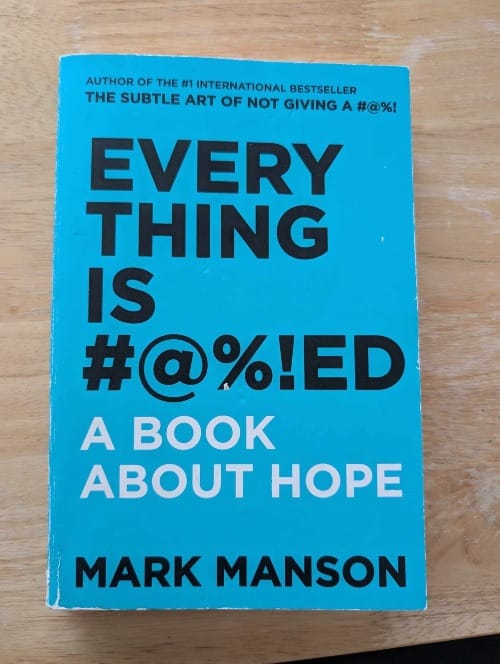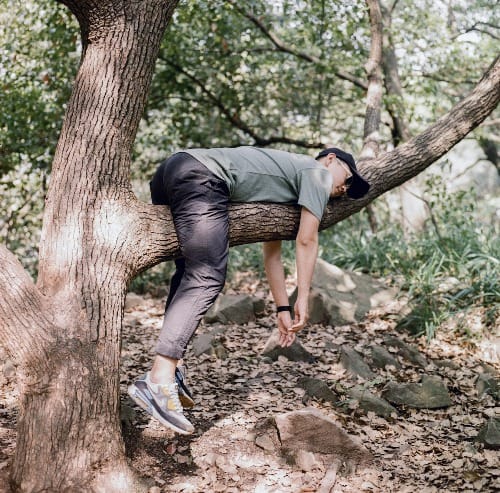Everything is f***ed

The author of the famous book "The Subtle Art of Not Giving a fu***" decided to write another book, this time about his vision of the world, how we live, and how we could live, which is very different from the first one but not less opinionated (and no less f-word).
This book is divided into two parts; the first one is called "Hope." Experts say we have two brains, one thinking brain and one feeling brain. The thinking brain is rational and suggests actions to the feeling brain. But this last one controls everything and decides which actions we're taking. Ancient philosophers made an assumption: "If a person is unable to control himself and is undisciplined, it's because he can't control his feelings." So people thought: "Oh, if we can remove the feeling part, people will be so efficient because they will only be rational." But the truth is that people will have no reason to live or take action and won't be motivated to do anything. So, no feeling brain equals no action.

Another aspect in this first part is the evolution of our identity. Our identity evolves, and our values evolve. For example, you go to bars every Saturday until 4 am and work the following day. In that case, you value social life with friends over sleep and work. But if you change jobs, for example, and that new job is more important to you, you'll stop partying. Not because you don't like drinking until 4 am anymore, but because your work and sleep became more important to you. The order of your values has changed. This switch is good and normal; it's called growth! You evolve, and your values evolve, too.
To finish the first part, he explains how to start your religion. So basically, sell hope to people that the world will be better without X or Y. Second, choose your faith and determine what will be important to you and your people. Third, invalidate everything from the outside: "The government says this or that, it's bulls***." Fourth, tell your people they need to sacrifice something for the greater good: their money, their time, some food, etc. Fifth, don't deliver what you promise and make them guilty that it's their fault the promises are not kept. Sixth and lastly, enjoy and ask more from your disciples. They are at your mercy, have fun!

There goes the second part, which he called: "Everything is f*****. First, the "Formula Of Humanity." As we age, our relationship with pain evolves. When we are kids, we touch the hot stove in the kitchen, and it burns; we learn that we should not touch it when it's hot. So we got hot -> pain. Then, we eat some cookies, and damn, it feels good. So hot -> pain, cookies -> pleasure. If Dad sees we ate twelve cookies, he will be angry. So, too many cookies -> pain because Dad is not happy with us.
In adolescence, we may eat those twelve cookies if we judge it's worth making Dad angry. The exchange is critical; it's a transactional approach. We will do something painful if we think the other side of the transaction is worth it. Everything is a transaction. We will love or like people because they could provide something for us. We will do anything to maximize pleasure and minimize pain.
Then, there is the last stage: adulthood. Being an adult means being able to do something for somebody, like loving someone or suffering for someone, unconditionally, without expecting anything in return. This stage is much more challenging to reach, and many people with trauma in their youth won't be able to get it without proper help. To achieve this stage, adolescents must learn that not everything is bargaining and that things that matter aren't part of a transaction.

Pleasure is temporary. Some studies mentioned that people usually feel medium happy(7 out of 10). This means that people who win the lottery will be 10 out of 10 during a few weeks, maybe months. After that, they will drop back to 7 as everybody else. The same thing happens to people who become paraplegic. During a couple of months after the incident, there will be a lot of modifications to their lifestyle, and it may be rough. However, these people will still be happy 7 out of 10 after some time. So, no matter what happens to you, it's normal not to be super happy 100% of the time; it's impossible.
It's also impossible to eradicate pain because it will always be there. Something will always cause pain. We must then choose for which reasons we are ready to suffer because suffering is part of every human life.

This is where antifragility jumps in. Antifragility is the ability to improve yourself in exchange for pain. A simple example he gave in the book is the gym. If you do a big workout, you will be exhausted and endure pain, but your muscles will grow, so you benefit from it. If you don't develop your antifragility, you become fragile. The more fragile we are, the more painful each necessary pain is going to be. So, we must be in a "growth mindset"(as in the other article) mode to be less intimidated by the pain that will occur whether we want it or not.
Next, we have democracy. In a democracy, the government gives people what they want. The truth is that people will never be satisfied. They will always want more. They don't want to suffer for the next generation; they want somebody to take action now for their happiness, NOW! Most people want to stay fragile in a fluffy blanket, be entertained, and ask more from the government, but they won't take a little suffering. It's challenging to start long-term projects with this mentality.

Finally, he said we shouldn't try to find hope and be better humans. We can't guarantee that the world will be better tomorrow, but at least we can improve the number of awesome people like you (<3)!
In conclusion, I enjoyed the second part of the book more than the first part since it was more concrete and less philosophical and abstract. It's not a book for everyone because, as I said, it's mainly a philosophy book, but it's a small read(236 pages). Happy reading!